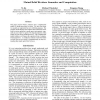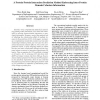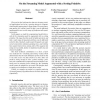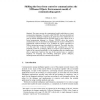115
click to vote
ECAI
2008
Springer
15 years 4 months ago
2008
Springer
We propose a computational model that facilitates agents in a MAS to collaboratively evolve their norms to reach the best norm conventions. Our approach borrows from the social con...
121
click to vote
AMI
2008
Springer
15 years 4 months ago
2008
Springer
To improve the performance and wellbeing of humans in complex human-computer interaction settings, an interesting challenge for an ambient (or pervasive) agent system is to recogni...
116
click to vote
AAAI
2007
15 years 4 months ago
2007
This paper presents both a semantic and a computational model for multi-agent belief revision. We show that these two models are equivalent but serve different purposes. The seman...
121
click to vote
BIBM
2009
IEEE
15 years 5 months ago
2009
IEEE
Recently, many computational methods for predicting protein-protein interaction (PPI) have been developed by utilizing domain-domain interaction or associated information. However...
120
click to vote
UKCBR
1995
15 years 5 months ago
1995
Various cognitive and computational models have addressed the use of previous experience to understand a new domain. In particular, research in case-based reasoning has explored t...
122
click to vote
CRYPTO
2006
Springer
15 years 6 months ago
2006
Springer
This paper presents the first automatic technique for proving not only protocols but also primitives in the exact security computational model. Automatic proofs of cryptographic pr...
119
click to vote
FOCS
2004
IEEE
15 years 6 months ago
2004
IEEE
The need to deal with massive data sets in many practical applications has led to a growing interest in computational models appropriate for large inputs. The most important quali...
116
click to vote
ATAL
2006
Springer
15 years 6 months ago
2006
Springer
As agent systems are solving more and more complex tasks in increasingly challenging domains, the systems themselves are becoming more complex too, often compromising their adapti...
122
click to vote
ECAI
1998
Springer
15 years 6 months ago
1998
Springer
We propose a computational model for analogy solving based on a topological formalism of representation. The source and the target analogs are represented as simplexes and the anal...
104
click to vote
COLLABORATION
1999
Springer
15 years 6 months ago
1999
Springer
The paper presents the computational model underlying new agent communication languages. The model, called STROBE, has been identified and two prototypical languages inspired by th...




